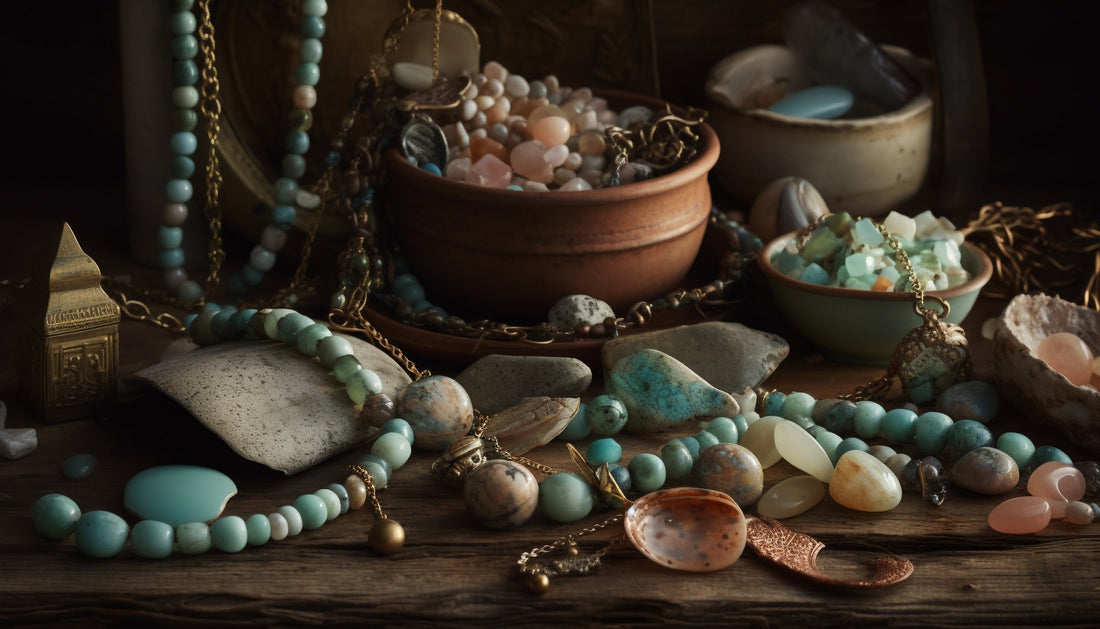
Silver, gold, opals, gemstones: How to care for different types of jewelry
JEWELRY CARE
- To extend the life of your jewelry, keep it away from lotions, perfumes, and harsh chemicals. Remove your jewelry before swimming or showering. Turquoise and opals are particularly delicate stones, so avoid wearing them during strenuous activities.
SILVER
To clean silver, use a soft cloth or a silver polishing cloth to remove tarnish and dirt. You can also wash it gently with warm water and mild soap. Always keep silver dry and store it in an anti-tarnish cloth or box. If you live in a humid environment, consider using desiccant crystals to prevent tarnishing. Avoid storing silver with rubber products, as they can cause discoloration.
GOLD
Clean gold jewelry using a soft-bristled brush and a mixture of warm water with mild, detergent-free soap. A jewelry polishing cloth or cleaning solution can also be used (be sure to check what your specific gemstone can handle). Always remove gold jewelry before activities such as cooking, cleaning, showering, gardening, sleeping, or exercising, as gold is a soft metal that can bend or scratch easily.
14K GOLD FILL
Unlike gold-plated jewelry, 14K gold-filled jewelry consists of a thick layer of 14K gold bonded to a base metal, making it more durable. With proper care, it can last a lifetime. To maintain its shine, use a soft cloth to wipe away oils, makeup, and residue after each wear.
CARING FOR NATURAL GEMSTONES IN JEWELRY
Natural gemstones add a unique and beautiful touch to jewelry, but they require special care to maintain their brilliance. While some stones, like diamonds and sapphires, are extremely hard and durable, others, such as turquoise, opals, and pearls, are softer and more prone to damage. Proper handling, cleaning, and storage are essential to keeping these stones in their best condition.
TURQUOISE
Turquoise is one of the most popular natural gemstones, known for its striking blue and green hues. However, it is also one of the most delicate. This porous mineral can easily absorb liquids, oils, and chemicals, which may alter its color and texture over time. If you want your turquoise jewelry to stay vibrant, it’s important to follow these care guidelines.
HOW TO CARE FOR TURQUOISE JEWELRY
✔ Avoid water and chemicals – Turquoise is sensitive to moisture, soaps, perfumes, and cleaning products. Always remove your jewelry before showering, swimming, or washing dishes to prevent discoloration or structural damage.
✔ Keep it away from oils and cosmetics – Since turquoise is porous, it can absorb natural oils from your skin, which may change its color over time. If you use lotions or perfumes, apply them first, allow them to fully absorb, and then put on your jewelry.
✔ Protect from extreme temperatures – Prolonged exposure to direct sunlight or high heat can cause turquoise to fade. Try to keep it away from excessive heat and store it in a cool, shaded place.
✔ Cleaning turquoise jewelry – To clean, simply wipe the stone with a dry or slightly damp soft cloth. Avoid commercial jewelry cleaners, as they often contain harsh chemicals that can damage turquoise. Never use ultrasonic or steam cleaners, as they can weaken the stone’s structure.
✔ Proper storage – Store turquoise jewelry separately from other pieces to prevent scratches. A soft fabric pouch or a jewelry box with a cushioned interior works best. If you live in a dry climate, placing a slightly damp cloth nearby (but not directly on the stone) can help prevent cracking due to dehydration.
OTHER NATURAL GEMSTONES
While turquoise requires extra attention, other natural gemstones also need proper care to maintain their beauty:
- Pearls – are highly sensitive to water and chemicals. Store them separately in a soft pouch and avoid prolonged moisture exposure.
- Lapis lazuli and malachite – Like turquoise, these stones are porous and should only be cleaned with a dry cloth. Avoid water and harsh cleaning agents.
- Amethyst, citrine, and quartz varieties – While more durable, these stones can fade if exposed to direct sunlight for extended periods. Store them in a shaded area when not in use.
OPAL CARE
- Opals are soft gemstones so handle them with care to avoid scratches or damage. Remove opal jewelry before activities like exercising, gardening, or cleaning.
- While some opals are water-resistant, it is still recommended to remove them before showering, swimming, or washing dishes.
- Avoid exposing opals to harsh chemicals, cleaning products or chlorine.
AUSTRALIAN OPAL
Solid Australian opals are not damaged by water, but they should be kept away from extreme heat or dry environments to prevent cracking. To clean, gently wipe with a soft toothbrush and mild soap in warm water.
OPAL DOUBLETS
Opal doublets feature a thin opal layer bonded to an ironstone backing. These should not be exposed to prolonged moisture, as water can seep between the layers and cause a cloudy or gray appearance. Clean by gently wiping with a damp cloth—avoid soaking or submerging them in water.
ETHIOPIAN & CANTERA OPALS
Ethiopian and Cantera opals are "hydrophane," meaning they absorb water and oils, which can dull their fire. To maintain their brilliance, avoid exposure to water, soaps, lotions, and temperature changes. Always remove these opals before washing hands, showering, or working out. To clean, gently polish with a soft linen cloth.
